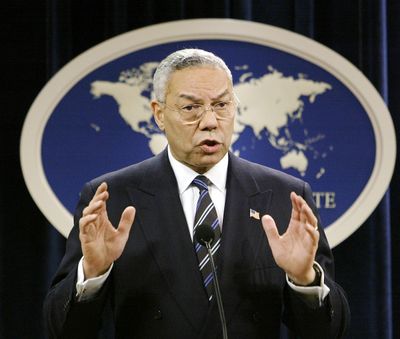CIA interrogation methods kept from Powell, report says

WASHINGTON – A Senate report on the CIA’s interrogation and detention practices after the 9/11 attacks concludes that the agency initially kept the secretary of state and some U.S. ambassadors in the dark about harsh techniques and secret prisons, according to a document circulating among White House staff.
The still-classified report also says some ambassadors who were informed about interrogations of al-Qaida detainees at so-called black sites in their countries were instructed not to tell their superiors at the State Department, says the document, which the White House accidentally emailed to an Associated Press reporter.
The 6,300-page Senate report on the CIA’s interrogation program has been years in the making. The findings are expected to reveal additional details about the CIA’s program and renew criticisms that the U.S. engaged in torture as it questioned terrorism suspects after the 2001 attacks.
A congressional official who has read the Senate report confirmed that it makes the findings outlined in the document. A former senior CIA official said the secretary of state at the time, Colin Powell, eventually was informed about the program and sat in meetings in which harsh interrogation techniques were discussed. But Powell may not have been informed when the techniques were first used in 2002, the official said. A spokeswoman Wednesday said Powell would not comment.
The former CIA official said it would be standard practice for ambassadors informed about a covert operation to be instructed not to share it with others who did not have a “need to know,” as determined by the National Security Council. Ambassadors in countries in which the CIA set up black sites to interrogate prisoners were usually told about it, said the official, who, like others interviewed for this story, would not be quoted by name because some information is classified.
The four-page White House document contains the State Department’s preliminary proposed talking points in response to the Senate report. It’s not clear who wrote it or how influential it will be in tailoring the Obama administration’s ultimate response to an investigation that has been the subject of bitter disputes.
The Senate report, a summary of which is expected to be made public in the coming weeks, concludes that the CIA used brutal techniques on detainees that failed to produce life-saving intelligence, and then misled Congress and the Justice Department about the interrogation program.